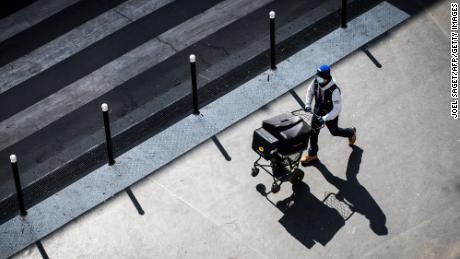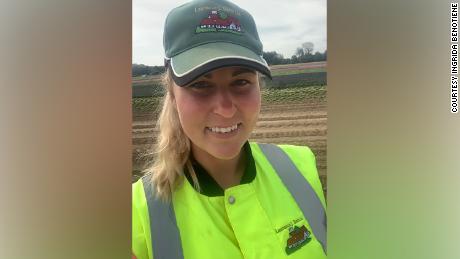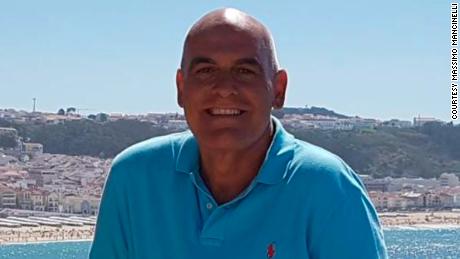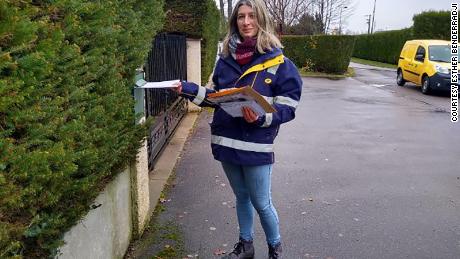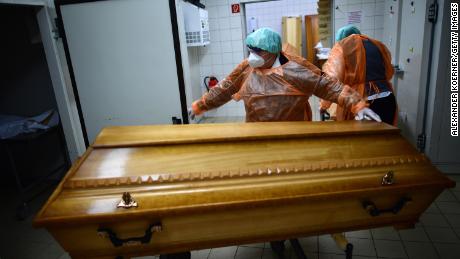(CNN)In March 2020, Europe's towns, cities and airports ground to a halt as the first wave of Covid-19 sent residents indoors. In the following months, many people began working from home. But amid the chaos and uncertainty, key workers including farm staff, transport employees and postal workers continued to perform their jobs as normal, forming an often invisible frontline during the pandemic.
Here are some of their stories.
A farm worker in Britain
Ingrida Bernotiene lives and works on a salad farm in Kent, southeast England.
The 33-year-old is originally from Lithuania and started working in agriculture aged 20, as a seasonal worker. She is now a production manager and helps oversee seasonal workers in the fields.
Bernotiene has worked throughout the pandemic, often spending whole days outside checking crops.
England entered its first national lockdown in March and a second one in November. The UK has been one of the worst-hit countries in Europe, with a tally of more than 71,000 deaths linked to Covid-19, according to Johns Hopkins University. But farms have continued to operate, in a crucial effort to maintain food supply.
"We were working day by day, six days a week [in the summer]," Bernotiene told CNN, adding that her schedule had been unaffected by the pandemic.
"And [we] usually start at 5 am and finish at 4 pm, and [have a] one-hour break. We didn't really feel [scared] much because we feel quite isolated here, [as] this farm is in the middle of the fields."
She added: "In the beginning [in March] we were more stressed."
Bernotiene said staff took precautions to socially distance and that during the summer the pandemic limited leisure opportunities.
"[There was] no traveling, no socializing, no pubs or restaurants," she said.
"We work a lot, [...] so usually in the summer anyway we have no proper life, so we [did not] miss ... much."
Bernotiene's partner also lives and works on the farm. But most of her family is in Lithuania and she hasn't been able to visit them since the pandemic began.
"That was the most difficult thing," she told CNN.
"They couldn't visit me [and] I couldn't visit them. Usually we see each other maybe once or twice a year."
Bernotiene will spend Christmas on the farm this year, where she and her boyfriend are planning to celebrate with a turkey for two.
Taxi drivers in Italy
The first coronavirus wave in Europe upended life in Italy. Hospitals were overcrowded with dying patients and lockdown was strictly enforced. On March 27, 2020, the country's civil protection authorities announced that 969 people had died in just 24 hours.
Massimo Mancinelli is a taxi driver in Rome. During the lockdown in March, he suffered a 90% drop in business. The continued lack of tourism and events has paralyzed the sector, according to the 60-year-old.
Mancinelli said he was currently only making 30% of his pre-pandemic income.
"Tourism and business are at a total standstill. Companies have allowed for teleworking from home, and cities, especially the historic centers, are totally deserted compared to in past years."
He added: "There is just no request for mobility ... the entire sector is at a standstill without any solutions ahead."
Mancinelli's comments were echoed by Andrea Carlieri, another of the city's taxi drivers.
Carlieri was born and raised in Rome and has worked behind the wheel for 15 years.
"Still today, the taxi sector is at a standstill because of the lack of tourists, events, ceremonies, concerts and shows," the 48-year-old told CNN.
"Solidarity is talked about often, but in reality is a lot less."
Carlieri added: "I have hope from the health care point of view even if I believe that economically, 2021 will still be very negative."
A postal worker in France
Esther Benderradji has three small children and lives in the small town of Senones in eastern France.
The 39-year-old has worked as a postal worker for the past five years and occasionally uses a "staby," a three-wheel electric scooter, to deliver the mail.
France imposed a stringent new lockdown in late October. Some of the restrictions were eased on December 15 but several remain in place. as the government grapples with a high Covid-19 case count.
For many of the people Benderradji delivers mail to, the arrival of the post has become a chance to connect with a familiar face.
"We are living in rural areas where the elderly are looking forward to seeing the postman, especially when they are cut off from the world like during the lockdown," she told CNN.
"It has become even more important to go see them, to maintain the link.
"During the first lockdown, people left us little notes on the mailbox, saying 'Thank you postman.' It really warmed our hearts," Benderradji added.
"But during the second lockdown, these little notes have disappeared, there are no more thank you notes, no more daily gratitude. Maybe people have got used to this. The postman has gone back to being the postman."
A security officer in Britain
Fane MacDonald works in security at a major hospital in central London. The 26-year-old started the role during the pandemic. His job includes having to turn away distressed family members, who are barred from visiting relatives in hospital under strict Covid-19 restrictions.
"Traditionally most of our work is to ensure that no one is coming into the hospital," MacDonald told CNN.
"So that can be a bit difficult, turning someone down who wants to see a loved one. But [with] most of the people here, it has been okay."
He added: "I went from seeing everyone walking and talking and then I'm seeing people come into hospital, plugged to machines. It was a big change."
Many of MacDonald's friends were placed on the UK government's furlough scheme but he says he was determined to work through the crisis.
"I'm seeing [...] a lot of my friends on furlough and [they're] all getting really bored," he said. "But for me I think I've been quite happy, I've just kept the same routine."
But the 26-year-old misses seeing his family and friends.
"At the start [of the pandemic in March 2020] I had a three-month-old nephew," he said.
"The next time I saw him he was 10 months old. It was kind of upsetting."
MacDonald lives in London and has been unable to visit other family members in Scotland during the pandemic. He plans to make the trip as soon as possible.
A bus driver in Germany
As the end of 2020 looms, Germany is in crisis.
On December 23, the country recorded 962 coronavirus-related deaths, the highest figure since the start of the pandemic, and five days later its virus death toll passed 30,000 fatalities.
Germany entered a national lockdown on December 16, in a bid to curb the surge of infection.
Throughout the year Nadine Rietenbach has been driving buses in Berlin.
''Before the pandemic, passengers boarded my bus at the front. It was so nice to say 'hello, how are you,' 'have a great day' or 'see you soon,'" she told CNN.
"Then from one day to the next this was all gone -- this was no longer possible," Rietenbach said, explaining how bus drivers were shielded from passengers to minimize contact.
She added: ''Initially we had a cordoned-off area that was meant to separate us from the passengers. Soon plastic clear foil similar to a shower curtain was put up to protect us from the passengers.
"At the beginning I enjoyed a bit of peace and calm but now I often miss the direct client contact. It's so quiet now.''
The 43-year-old carries disinfectant with her and cleans her bus wheel before she begins to drive.
"I never felt unsafe and I was never afraid of catching the virus -- not during the first coronavirus wave and not now -- the second wave. I am fine," she said.
The Berlin resident feels lucky still to be working.
"I did not mind going into work, I can't do home office in my job," she said with a laugh, although she noted that passenger numbers on buses had fallen.
"There are many more cars on the road since the pandemic struck -- so perhaps not everyone likes to be on public transport at this time," she said.
"Perhaps it will take all of next year for us to get back where we were [before the pandemic.]''
There are glimmers of hope for a better 2021 in Europe.
The BioNTech/Pfizer vaccine has now been approved and launched in the UK. The EU is also considering the vaccine for approval and is expected to make an announcement in late December. There is growing optimism across the continent that people will return to some semblance of normality within the next year.
But for many unseen workers, who carried on with their jobs during the lockdowns and crises of 2020, life will remain much the same.
